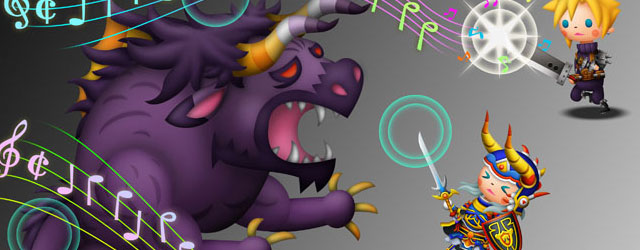[tab:Review]
Let me be honest right up front: I have never played a Final Fantasy game. Through no particular effort I have managed to get through my entire life as a gamer without touching one. Knowing that, I was curious to see how I would feel about Theatrhythm Final Fantasy, a game that takes characters from the Final Fantasy universe and puts them in a rhythm game featuring music from the series. The result is a surprisingly deep rhythm game with some interesting twists with some excellent Final Fantasy fan service.
The game begins as you pick a party of four players from the thirteen available and go out to collect Rhythmia, which is needed to restore the Music Crystal and ward off chaos. All of the characters are from Final Fantasy games, and by collecting crystal shards throughout play, you can unlock additional characters. Each has a set of standard RPG attributes like strength, magic and luck, which will affect their performance in the different stages.
Rhythmia is earned by playing songs from different Final Fantasy games. Each game has Battle Music, Field Music and Event Music tracks, as well as optional opening and closing themes that can earn you extra Rhythmia. In the three main tracks you earn Rhythmia based on active things like how good your timing with the notes is and consecutive note streaks, and passive bonuses for having items equipped or having a character from that particular game in your party.
Playing the music is really well executed. Tapping, sliding or holding the stylus plays the different types of notes as they cross your target on the screen. Battle Music looks like an RPG battle – each character has a note line, and they do damage to an enemy based on how well you hit the note. In Field Music, your success with the notes determines how far your character gets down a path, with longer progress rewarded by items. In Event Music, it’s the target that moves, and you must play the notes on its path as scenes from Final Fantasy games play out in the background. Each song will have a section of special notes that will give a bonus if hit correctly, much like in Guitar Hero or Rock Band games.
As you finish tracks, your party members will gain experience, level up and gain new items and spells, adding an element of strategy. For example, in battle mode, the number of missed notes you can have before failing is dependent on the total HP of your party. Picking stronger characters, or ones with healing spells, can help you finish a tough song. Characters with higher agility and luck will move through Field Music stages faster, and are more likely to find items.
You can change your party to suit a particular song in challenge mode, but in series mode you’re playing with the same group for all three songs, meaning that you have to pick a group with mixed skills. Only the characters in your party level up, so if you’re planning to use more than four, you’ll need to rotate them frequently in order to avoid a weak character pulling you down. Being able to equip spells and items adds a nice twist, but since you have no command over how and when they are activated, it lacks the satisfaction of using a powerful spell that you would get from a normal RPG. Those looking for a straight rhythm game may be turned off by the extra mechanic.
Finishing a game’s songs in series mode gives you access to them in challenge mode, which adds expert and ultimate difficulties. Completing challenge mode in expert difficulty for all of a game’s songs unlocks expert difficulty in series mode for that game. In addition to all of that, progress through the game unlocks Dark Notes, special combinations of random Battle and Field songs with random difficulty and attributes, making each set unique. You can trade Dark Notes with other players via StreetPass, giving you an almost unending supply of content. If for some reason that’s not enough, there are also DLC songs available for purchase.
The gameplay is fun and very responsive. Even on the harder songs, I knew that missed notes were my fault and not the game’s. The different styles of note track in each mode is nice, and each presents a different kind of challenge. The Battle Music tracks are the most fun, especially when you’re frantically watching four paths of notes while trying to see if you’ve fought your way to a boss character. The Field Music tracks are visually bland, and the Event Music track backgrounds are all scenes from Final Fantasy games, so unless you’re familiar with them (and in many cases can read Japanese) they don’t add much.
The music sounds good, and the note tracks match up nicely. I’m sure that for fans of the Final Fantasy series, the opportunity to play some of their favorite songs from past games is very exciting, but even being unfamiliar with them I enjoyed playing them and got some of the tunes stuck in my head. One small complaint I had with the game design is almost everything requires two taps, which can be annoying when navigating the menu or equipping your party.
Theatrhythm Final Fantasy is a solid rhythm game wrapped in a shell of Final Fantasy. If you’re just looking for a rhythm game, it’s a good choice, provided you’re willing to put some time into characters and skills to have the best experience. For fans of the series and the music, there’s a ton of content here, with just enough of an RPG splash to get your fix. Great additions like collectible trading cards and unlockable movies make this an easy recommendation for fans of the series.
Review copy of game provided by publisher.
[tab:Screenshots]
[tab:END]

